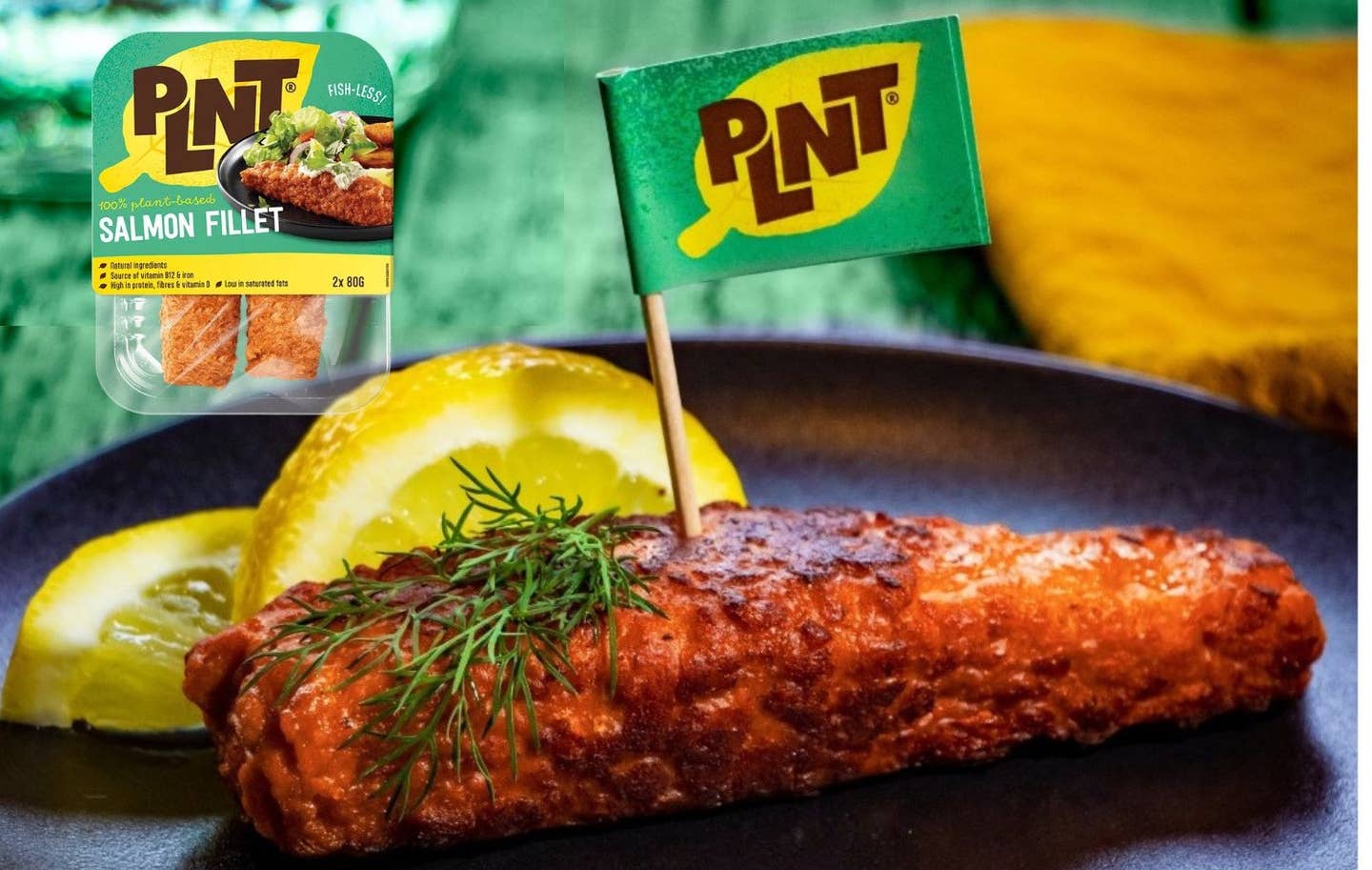
Vegan Salmon Is Coming to Stores This Month. Find Out More
Nearly 85 percent of the world is actively worried about pollution and the ocean, however, Americans are still eating 918 million pounds of salmon every year. Despite evidence that overfishing is hurting fish populations and oceanic ecosystems, demand for seafood remains high. Now, Dutch plant-based brand PLNT is launching a 100 percent vegan salmon fillet across Europe, to provide a more sustainable option.
PLNT's innovative vegan salmon features a proprietary blend of pea proteins, providing consumers with an allergen-free option packed with proteins and essential vitamins including B12 and iron. The new salmon product became available through food service and retail channels on December 15.
“We source our ingredients as close to home as possible, with wheat from Denmark and the Netherlands and soy from Austria, which are just two examples,” Marleen Kolijn, senior brand manager at PLNT, said. “We enter a new phase. Consumers in many countries agree that we need to eat less meat and fish because of the environment and personal health, and demand meat and fish successors to adhere to those standards."
PLNT debuted the new vegan salmon filet along with two plant-based chicken products: Chicken Nuggets and Chicken Tenders. The chicken products use wheat protein. The company also highlights an innovative manufacturing process, which relies exclusively on hydropower instead of fossil fuels.
Vegan Seafood Hits the Mainstream
Now that the vegan meat industry is well-established, several plant-based brands have introduced seafood alternatives to their line-ups. The plant-based fish market is expected to reach a top valuation of $1.3 billion by 2031 as consumers look for options that benefit their health and the environment.
Recent studies revealed that commercial fishing is contributing to an increase in toxins and microplastics in the ocean. This increased level of toxins is associated with a higher risk of skin cancer for individuals regularly consuming seafood.
PLNT's vegan salmon joins a growing portfolio of plant-based alternatives to the popular fish. This January, Israeli food-tech company Plantish unveiled its first whole-cut salmon filet. The company's vegan fillets will feature the same nutritional value as conventional salmon, complete with a high protein count and filled with omega-3s, omega-6, and B vitamins. Plantish also guarantees that it is free from mercury, antibiotics, toxins, and microplastics that are commonplace in conventional seafood.
Shortly after, Revo Foods debuted an "ultra-realistic" 3-D printed salmon filet. The company expects to launch the whole-cut salmon in early 2023, providing a near-identical vegan salmon packed with protein and omega-3s sourced from pea protein and algae.
Overfishing is Destroying the Environment
Although consumers are increasingly concerned about the environment, shoppers are slow to give up their beloved seafood dishes. But last March, Netflix premiered Seaspiracy, a documentary exposing the planetary dangers stemming from commercial fishing. The documentary showed that fishing nets account for 46 percent of the Great Pacific Garbage Patch. The exposé warned that continued commercial fishing will mean that oceans could be entirely empty by 2048.
This October, research revealed that introducing protein-packed, nutrient-rich microalgae could help increase food production by 50 percent by 2050. Reducing reliance on meat and seafood in favor of algae-based protein could help feed 10 billion people worldwide as the planet faces unprecedented environmental issues. This could potentially alleviate consumer reliance on seafood for certain nutrients while also helping protect the environment.
For the best plant-based seafood available, check out our Beet Meter for the top vegan seafood.
You may think iron is synonymous with meat, and while animal protein certainly has it, that doesn’t mean you can’t get enough iron if you eat a mainly plant-based diet. In fact, you can, if you know the right foods to choose and how to pair them. The daily recommendation from the National Institutes of Health (NIH) for iron intake is 18 milligrams (mg), but not all iron sources are created equal. Here’s what plant-based eaters need to know about iron and which iron-rich foods are best to help reap the benefits.
1. White Mushrooms
1 cup cooked = 3 mg iron (17% daily value (DV))\There are many reasons to eat mushrooms on the regular, but their meaty texture (try a Portobello cap as a meat replacement for a burger!) and ample protein are two of the highlights. Add them to your stir-fry, tacos, or even instead of meat in a faux Bolognese sauce.
2. Lentils
1/2 cup = 3 mg iron (17% DV)You don’t need to eat a huge serving of lentils to get a hearty dose of iron. Just a half-cup provides close to 20% of the iron you need in a day. Just like mushrooms, lentils have a meaty texture that works well in burgers, tacos, or grain bowls.
3. Potatoes
1 medium potato = 2 mg iron (11% DV)The poor potato has gotten such a bad rap. Fear of this carb-rich spud is unwarranted because it’s actually an affordable and delicious source of iron and potassium. So go ahead and have that hash, baked potato, or potato soup and leave the skin on for some added fiber.
4. Cashews
1 ounce = 2 mg iron (11% DV)Most nuts contain iron, but cashews are a standout because they have less fat than some of the other nuts. One ounce of cashews (about 16 to 18 nuts) has 160 calories, 5 grams of protein, and 13 grams of fat. Add a handful of cashews to smoothies, soups, or sauces for some extra creaminess.
5. Tofu
½ cup = 3 mg (15% DV)Not only does tofu have plenty of protein and calcium, but it’s also a good source of iron. It’s very versatile and takes on the flavor of any sauce or marinade, making it a great meat substitute.Keep in mind that you can easily get the iron you need from a plant-based diet.
More From The Beet






